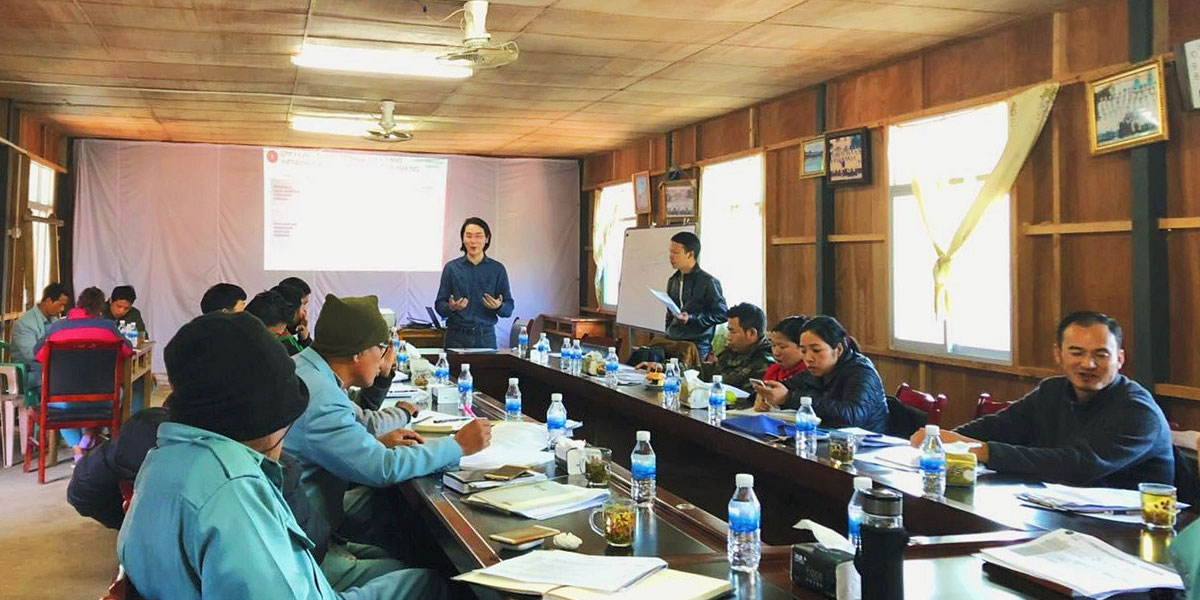
The University of Washington is being recognized for its rich, collaborative ecosystem and wide-ranging community engagement efforts – elements that are at the heart of what we do in public health.
The UW last week received the Carnegie Community Engagement Classification, an elective designation that indicates institutional commitment to community engagement. The UW School of Public Health is excited about the achievement, which is a testament to the School’s community partners and to students, faculty and staff who share the UW’s commitment to advancing the public good.
“We’ve been engaging with communities for a long time, and this recognition is an opportunity to lift that work up,” said Hilary Godwin, dean of the UW School of Public Health. “The Carnegie classification allows us to see the linkages across campus and how much engagement there is. It also gives us an opportunity to create new connections.”
The classification was awarded to the UW by the Carnegie Foundation for the Advancement of Teaching following a process of self-study and a national review. More than 600 current examples of community engagement were documented during the study, dozens of which were included in the UW’s final assessment.
The UW School of Public Health has a strong foundation of community-engaged public health research, learning, practice and service. The School has deep and long-standing partnerships with both the local public health department, Public Health – Seattle & King County, and the Washington State Department of Health. It has also formed strong bonds with local organizations such as El Centro de la Raza and Casa Latina. Each of the School’s departments and programs have built their own collaborations with local, national and global partners.
Students in the School may conduct community-engaged research projects for their capstone or practicum. These projects draw from a community-based participatory research framework, involving communities in the collaborative development of research tools.
The Community-Oriented Public Health Practice (COPHP) program in the Department of Health Services requires students to work with community partners to produce deliverables addressing the partner’s needs and interests. All courses in the program center community engagement as a critical public health skill. MPH students in COPHP are currently working on projects with the following organizations:
- Alaska State Division of Public Health, in partnership with ANTHC
- American Lung Association
- Breast Cancer Association of Nigeria
- Capitol Hill Housing
- Ethiopian Community in Seattle
- Fred Hutch Research Center
- Healthy Food America
- International Organization for Migration
- Q Card
- Sanyu Babies’ Home in Uganda
- Seattle Children’s
- Straight Talk Foundation in Uganda
- The Office of Rep. Gerry Pollet
- Urban Indian Health Institute
- UW School of Nursing, Department of Child and Family Nursing
- Vietnam’s Southern Institute of Social Sciences
- Village Reach
- Washington Supreme Court Gender & Justice Commission
Experiential and service learning goals are also articulated by the School's undergraduate Public Health-Global Health major. A capstone course is part of the core curriculum for the major. Over two quarters, seniors draw upon knowledge they gain through coursework as they serve populations in a community-based, public health setting – a concept called service learning. About 250 students in the major take part in the capstone every year, performing at least 12,000 collective hours of service at more than 26 organizations across Seattle. Organizations have included ROOTS Young Adult Shelter, Ballard Senior Center, Cherry Street Food Bank, Recovery Café and El Centro de la Raza.
Team-based capstones are also part of the Food Systems, Nutrition and Health major and the Graduate Coordinated Program in Dietetics, housed in the Nutritional Sciences Program, and the Health Informatics and Health Information Management program. The Environmental Health major has an internship requirement.
The School’s MPH practicum program, which integrates classroom learning with professional and practical experience, has hundreds of community partnerships. About 40 students every year work with community organizations to address real-world public health challenges.
Last year, Cassie Pawloski, an MPH student in the Department of Health Services, worked with Industrial Areas Foundation Northwest – a regional network of community alliances – to develop campaigns to address homelessness and child obesity in South King County. Another student, Haley Millet from the Department of Global Health, worked with Health Tanzania Foundation to develop an organizational theory of change, a monitoring and evaluation framework, and a funding proposal that was eventually granted by the Khaki Foundation.
“For us, it’s critical for the way we train our students,” Godwin said. “We want them to have real-life experiences and to work on real-life problems. Working with organizations based in the communities helps them better understand community priorities and perspectives.”
The School also takes part in UW-wide events and initiatives that support and advance community engagement. Livable City Year (LCY), a campus-wide project led by the Department of Urban Design and Planning and the School of Public Health, engages UW faculty and students across multiple disciplines to work on high-priority projects identified by our community partners. Cities identify projects for students and faculty, and LCY staff develop course-based partnerships that engage one or more students in collaboratively addressing projects. So far, LCY has partnered with the cities of Auburn, Tacoma and Bellevue.
The School of Public Health is also part of a coalition that partnered with local leaders and organizations to create Othello-UW Commons, where community partners and the UW can co-design and participate in community-driven teaching, learning, service and research in South Seattle. The effort was led by the Office of Regional & Community Relations and Undergraduate Academic Affairs.
Also, the School of Public Health joins other UW Health Sciences schools to formally recognize community engagement and service with the annual Martin Luther King, Jr. Community Service Award, which honors students and faculty from each school that exemplify Dr. King's principles through commitment to addressing community needs.
